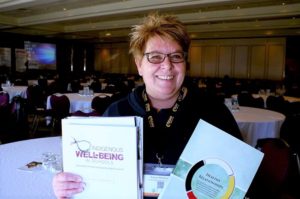Indigenous well-being resources identify First Nations students needs

By Rick Garrick
THUNDER BAY—The Ontario Native Education Counselling Association (ONECA) has developed two Indigenous Well-being guides based on its Indigenous Well-Being in Schools Understanding, Promoting and Supporting Indigenous Learners Final Report.
“We brought together Indigenous educators and counsellors from across the province to look at what well-being looks like in a school,” says Roxane Manitowabi, executive director of ONECA. “We collected all of their ideas for First Nation students, so [for] a school that was totally responsive to all the needs of First Nations students, what would it look like in your school.”
Manitowabi says the engagement process, which was funded by the provincial government, featured a two-day session with the educators and counsellors in October 2017 in Sault Ste. Marie.
“We wanted to make sure that all the needs of the students were taken care of, so we looked at their spiritual needs, physical needs, mental and emotional,” Manitowabi says. “How do we make sure all of those things are taken care of so that our students succeed in school?”
Manitowabi says the participants also identified resources they need to support themselves in their roles at the community level.
“So we rolled up the report and took their ideas and created some resources to support that,” Manitowabi says, noting that the guides include information on topics such as healthy relationships, domestic violence and bullying. “We created a web-based resource guide because a lot of our students are in provincial schools and they may not have access to the community.”
The Indigenous Well-being resources — Maintaining Balance, Web-based Resource Guide and Final Report — are posted on the ONECA website.
The Maintaining Balance guide provides information about different activities that can be used to keep Indigenous youth in touch with their home territory, identity and cultural heritage while the Web-based Resource Guide is designed as a companion document to the Final Report.
“[The Web-based Resource Guide] is broken down into different sections,” Manitowabi says. “So if you are looking for spiritual supports for an Indigenous student, there are links there, and you can go to the mental, emotional or physical [support links]. We listed different organizations and supports where you can get help for our Indigenous students.”
Manitowabi says the guides were sent to all of the First Nation schools and provincial school boards across the province.
“Our office is like a mailroom right now because we had such an uptake on this,” Manitowabi says. “People are asking for 50 more copies, so we may have to do a reprint on some of this material. I’ve had one of the directors of education say this is the best resources that they have ever seen.”
Manitowabi says all of the 100 or so copies of the guides that she brought with her to the March 5-7 Matawa Education Conference in Thunder Bay, where she delivered a workshop along with RCMP corporal Cheryle Hayden on Talking to Your Students About Healthy Relationships, were gone by the beginning of the third day.
Manitowabi says the workshop was “very interactive.”
“The key parts were looking at how to identify if you are in an unhealthy relationship,” Manitowabi says. “We did the bill of rights, we talked about safety — a big portion of this is around safe dating. And we covered some information on online dating as well.”


